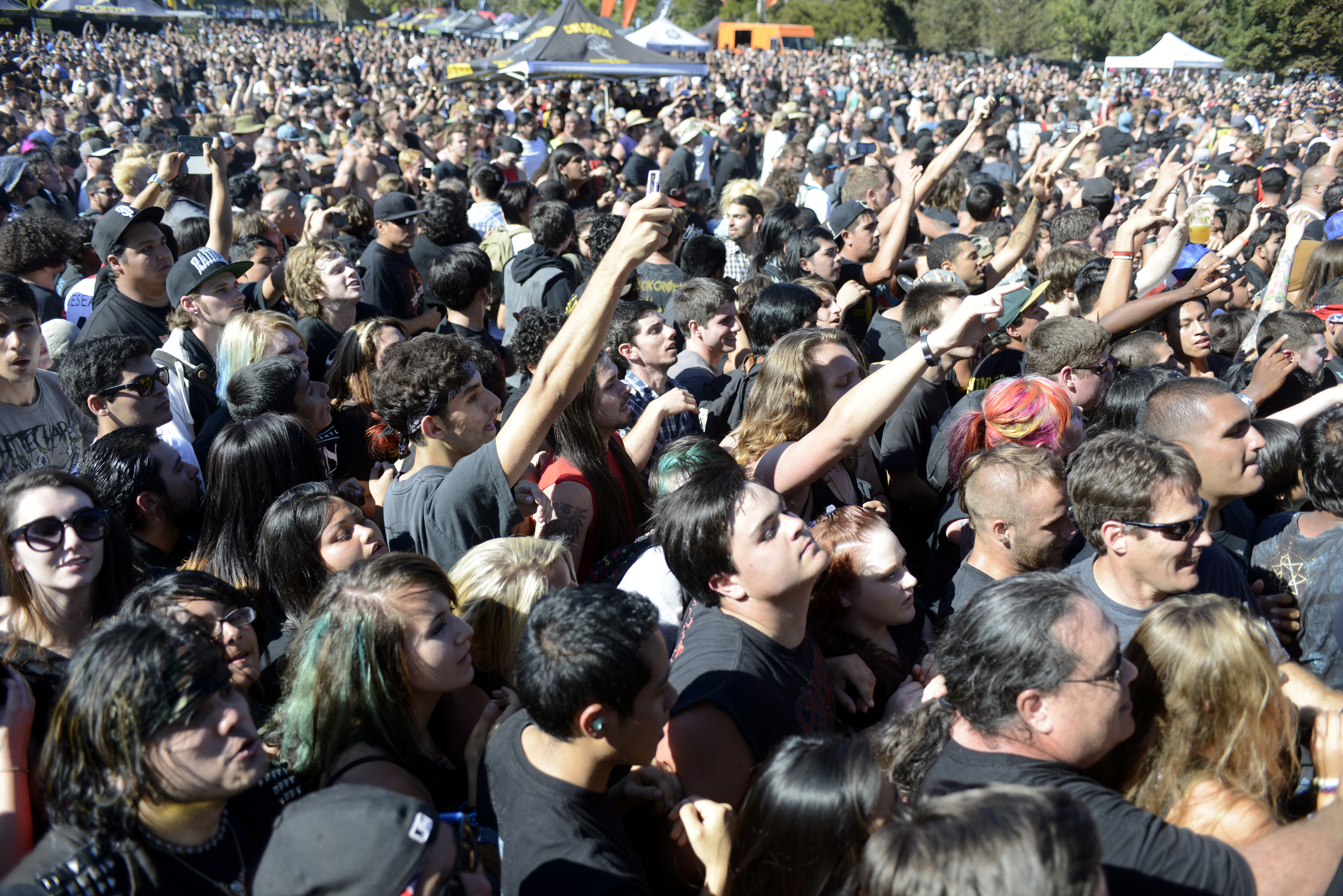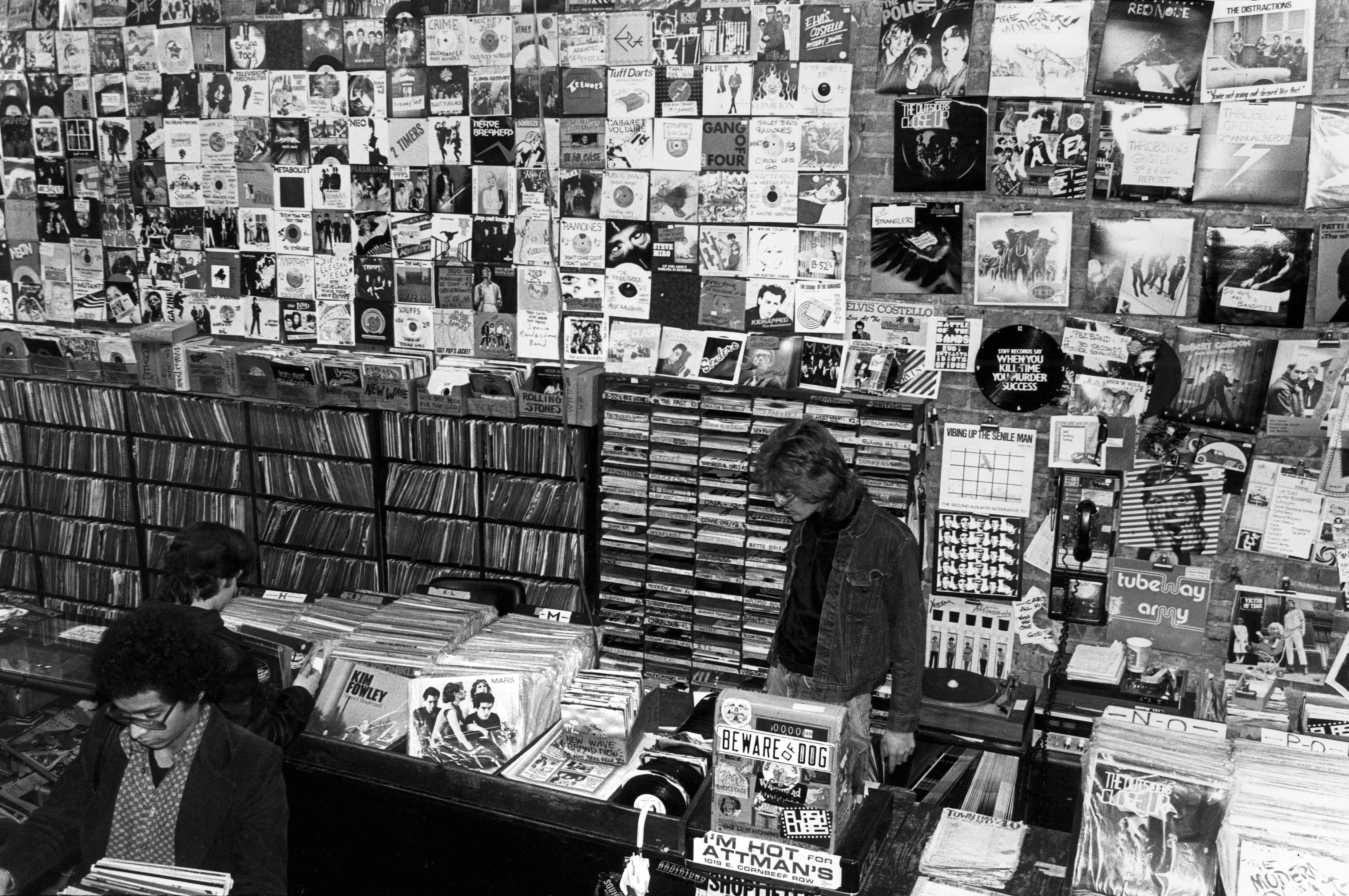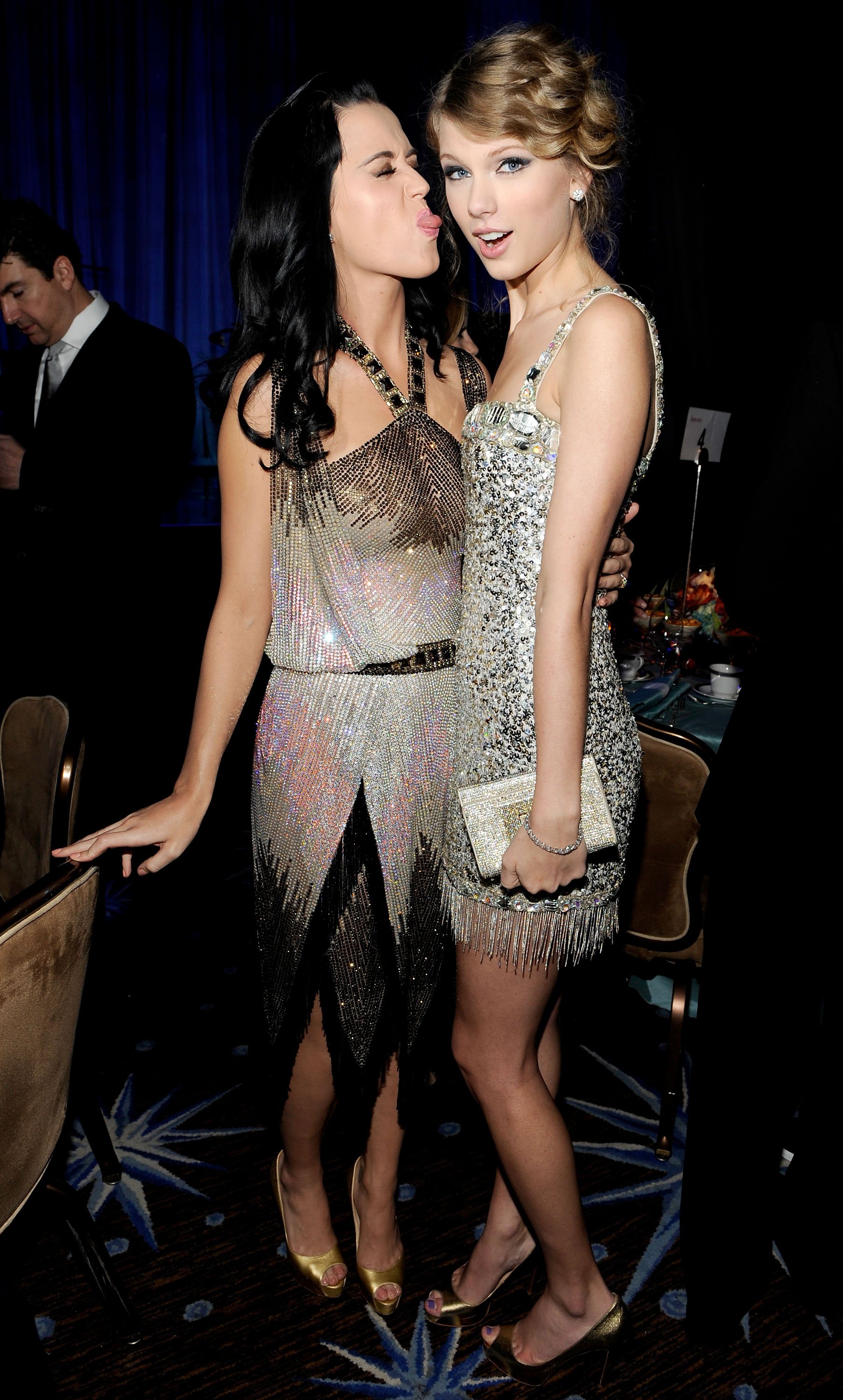The cancellation of Sonisphere 2015 and the festival’s reasoning – ”We’ve been working hard to get a line-up that we felt was good enough” – reveals the challenge facing festival promoters today: it’s getting harder and harder to put a worthwhile line-up together.
I see it in the US. John Reese’s Mayhem tour annually weaves through Arizona with a numbing predictability. Every year the Mayhem bill looks and feels like a reshuffle of previous years. It’s gotten to the point that I find it hard to summon the enthusiasm to get off my bar stool and go look at the stage: “They’ve all been here and we’ve seen all that and, ho-hum, is there anyone on the bill doing anything more than going through the motions?” The last time I left my beer and headed out into the 110 degree heat was to see Lemmy play. That was in 2012. Otherwise it’s “Barkeep - pour another – I’ll watch Korn, Avenged, Slipknot, whatever, on the bar TV again.”

Fans at Mayhem festival, 2014
Festivals themselves are becoming bloated and tiresome. Expensive. With most, the driving motive is to squeeze every last penny from the audience assembled. Get ‘em there for a day, try to make ‘em stay for three and put a vice grip on their wallets: $12 for a beer. Bottle of water? Four bucks. To counter a sense of exploitation, the promoters throw up multiple stages and populate them with as many inexperienced low cost bands as they can find. Some make them pay to play. Never mind that competing PAs create a dissonance. Never mind that multiple stages dissipate focus and audience unity. Never mind the quality, mate, feel the fuckin’ width.
The Sonisphere cancellation highlights the fact that festivals have issues and perhaps a major contribution to their plight is the fact that record companies long ago gave up on rock’n’roll artist development. Every year I await the crew who will reach for the crown that once sat, lopsided, on Guns N’ Roses’ head - every year I await the new standard bearers of rock’n’roll’s most intense attitudes and insights. But the truth is, there’s not much on the horizon when it comes to compelling new bands.
Here’s how it used to be: back in the late 50s and early 60s, the concept of artist development was directly connected to the release of singles. Record enough good singles, over a period of time, and you’d have them compiled into an album. In the 70s and 80s, if you managed to get a record contract and a debut release, you’d be put on the road to support that record. If you managed to sell 100,000 units through touring then you might get the chance to record another album. Get that to the 350,000 sales mark and you would probably be asked to make a third record, and the label would look to push that sucker over the top.

A record shop, 1979. Back when people used to buy records.
The method was called ‘artist development’ - a concept that understood that it takes time for a band to find and hone their particular sonic consciousness. It was a concept that understood that the chemistry of a band takes time to ferment. Stage craft and composing skills are acquired by exercise over time – it might take three to four years to work through two album/tour cycles.
It took five years for Great White (a band I managed and co-wrote for) to burnish their collective idiosyncrasy. Their songs are still on American radio 25 years later – and the undeniable test of quality is time itself. Moreover, artists aspire to development and growth. Roxy Music’s creative and commercial peak was with on Avalon, Dire Straits’s with Brothers In Arms. Consider too that Columbia came within a whisker of dropping Springsteen after his second album because it hadn’t progressed sufficiently in sales. Jon Landau, then an influential rock critic, probably saved his ass by describing him as “the future of rock’n’roll.” The Boss was motivated to up his game for the third album.
Look at it from another perspective. There are only six songs in existence - I love you; I hate you; I feel good; I feel like shit; the world is great; the world is totally fucked up and beyond repair. We respond to these statements time and again because we fall in love with the particular way in which an artist expresses these themes through the individuality of their personality.
We react to the peculiarity of the performer - the way that only they can say it. Peculiarity and particularity. These are the keystones of an artist. I don’t play the way Neil Young does – he has his own way of rockin’ in the free world – but I recognise our shared humanity when he sets my head alight with the content and character of his performance. And character takes time to develop.
The labels were always guilty of formula and repetition: “That worked, so let’s try it again, with something very similar.” In the 60s, however, the formula was found more in the differences: “There’s already a Cream, so let’s have a Santana”. As the interest in rock music grew so did the companies that sold it – they grew into global corporations, populated by lawyers and accountants, and they answered to elitist stock holders. Free voices became a risk. Free voices question corporate agendas. The formula became compliance - play it safe and play down to the defined audience.
MTV exacerbated the application of formula - “make it look a certain way and we can get to the major profit of platinum sales, immediately, on a debut record.” At first, Guns were an exception that confounded the MTV selection process. MTV didn’t want ‘em but their audience did. Starfucker Geffen now decided he was in ‘the rebellion business’. Enter Nirvana. Even so, both Guns and Nirvana, unwittingly, contributed to the abandonment of artist development in favour of image projection. Image triumphed over content. Geffen himself cashed out and sold out to the Japanese.
Labels who once boasted artists like Pink Floyd, The Beatles and The Band, are now proud to consider the likes of Katy Perry to be their great performers – ‘talent’ that requires career auto tuning for their superficial presentation and material. More time is spent in make up than the studio. Major companies now prefer to trade in social media attention freaks like Taylor Swift rather than artists. Scarcely a day goes by without another picture of Swift on MSN. She sets the bar for pointless over exposure, for vacuous celebrityhood.

“Setting the bar for vacuous celebrityhood”: Perry and Swift
Labels couldn’t give a shit about taking the time to support and develop a profound voice. Bob Dylan would be lucky to get on the bill at Maverick or Ramblin Man, let alone be signed by a major. Record corporations want something cheap and catchy, something they can safely and swiftly sell to the telephone companies. They are in the profit business, not the art of expression business. Fuck the artist. Fuck investment. Pharrell Williams made a mere $2,700 on 43,000,000 streams of Happy. Try making sense of a contemporary accounting statement. Today’s labels, run by executive committee, are but a pale shadow of the outfits once owned and run by individuals who would apply their singular, personal, taste and vision. Today we lack the Blackwells, the Erteguns, the Ostins, even Geffen. Today we are mired in a clueless method devoid of inspired purpose.
Why should record labels invest in artist development? Why should any company invest in research and development? According to Forbes the average cost to a pharmaceutical company of researching and developing a new drug is $1,3 billion dollars. Drugs are their basic commodity. Developing new ‘product’ is essential to the company survival. Rock’n’roll used to be the basic commodity of record labels. New artists brought new records which meant the catalog grew. Record companies used to base their annual financials on catalog sales, and in a way they still do. The labels decided to abandon their form of R&D and concentrate on the exploitation of existing catalog by selling it to the telephone companies.
They cry ‘poverty in the digital age’ but the interesting fact is that artists are not informed as to the detail, nature and wealth of the deals that labels make with the phone companies. As a composer and a producer I have no idea how much the phone companies pay the labels for my intellectual property. All I do know is that I am paid fuck all for the body of work that I created. Call me a cynical bitch, but I suspect the record company is doing just great at my expense. So much so they couldn’t give a fuck about developing new rock’n’roll artists. That, to me, is a betrayal of the purpose of record companies. There is a moral and spiritual aspect to all we do in life, and profiting from generating a sense of social unity by dispensing music is fine. It was actually beautiful. What I take issue with is greed and exploitation with no other sense of purpose than profit.
True, the initial interest in a band can inflame dramatically via the internet, but I worry for a band like Royal Blood - too much attention too soon … now let’s see if they can grow and develop in the glare of all this interest. Let’s see if they truly have something to say. There are a number of contemporary bands which have a great vibe but are not necessarily as sharp as they might yet be. Compare the releases of 1973 with those of last year. The record of the year for 2014 wouldn’t even get a look in.
Most bands grow into their prime. The Rolling fuckin’ Stones became truly remarkable and profoundly individual with the release of their seventh album. Glyn Johns said that was when they came of age. I say that’s when they became eternally ageless.
They say we get the government we deserve, and that the ultimate franchise is the ability to vote with our wallets. In that respect the dimwits who don’t know which Stones album I am referring to deserve the crap that labels are offering them. And the cancellation of Sonisphere.
Festivals? Camping? British weather? Understand that my definition of camping is ‘room service quits at midnight’. One day, one stage with one great bill is the way to play it. Maybe something like Maiden, ZZ Top, Megadeth, Motorhead, UFO, and an up and comer, a future, developing, headliner like Guns N’ Roses. Yeah, that’s the fuckin’ ticket and how it used to be done.
_Alan Niven managed Guns N’ Roses from 1986-1991, and managed and co-wrote songs for Great White _

